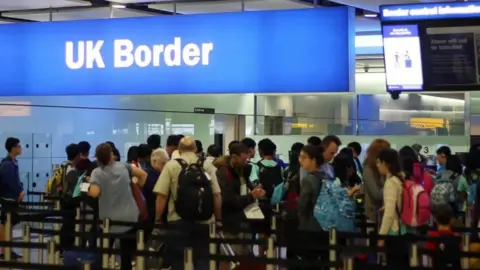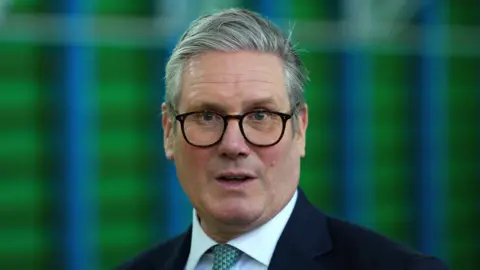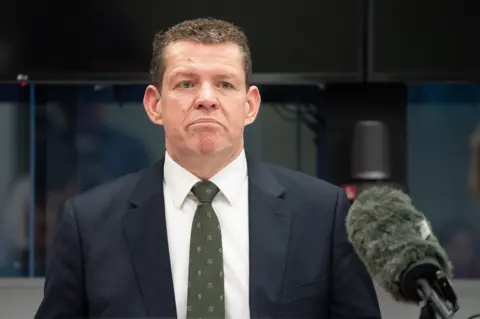Gareth Lewis: Where do parties stand on immigration?
 PA Media
PA MediaSome of the views expressed and language used in the Wales Investigates programme are way beyond what we are used to hearing in normal political discourse.
An undercover BBC reporter spent a year investigating a far-right group, and its members were recorded using racial slurs, with one suggesting migrants should be shot.
A former counter-extremism commissioner concludes such organisations should be banned.
Groups such as these have no political expression or representation in the Senedd, or among Wales' MPs at Westminster.
It would be irresponsible and wrong to conflate such extreme views with many voters' and politicians' genuine concerns about levels of migration.
Asylum and immigration currently sits in the top three of YouGov's respected issue tracker along with the economy and health – the tracker charts what voters care most about.
Public services are stretched – and have been for years – leaving many voters worried about further strain on GPs, hospitals, schools and roads if there are more people to cope with.
Although by no means a scientific poll, voters repeatedly brought up immigration as one of their biggest worries during the 2024 General Election campaign.
As it happens the raw numbers for Wales are small.
For the year to June 2023, there was net migration – the difference between the numbers arriving and the numbers leaving – of 906,000 across the UK. Only about 8% of that figure represents people seeking asylum as opposed to coming here for work, study or to join family.
In Wales the figure was 23,600 – a smaller percentage share than Wales' population as a whole compared to the rest of the country.
This figure and the issue tracker perhaps suggest that voters take a broader view of immigration – it does not need to happen on their doorstep for them to care about it, as the money to deal with it ultimately all comes from the same pot.
So where do the parties stand?
It is worth remembering that immigration policy is controlled by the UK government and not Welsh ministers in Cardiff Bay.
 PA Media
PA MediaLabour
Labour won a landslide at last July's General Election without having immigration as one of its specific five "missions". The party has promised to go after criminal human-trafficking gangs to tackle the issue of illegal migration at source.
It also made sure the courts prioritised the prosecution of those involved in racist extremism – whether in person or online – following the summer riots.
The Welsh Labour government unveiled its Nation of Sanctuary plan exactly six years ago – it aims to support refugees and asylum seekers and help them make a full contribution to Welsh society.
Conservatives
The Conservatives under newish leader Kemi Badenoch are still weighing up where they want to cap the level of legal migration into the UK.
She said last week that the party got it wrong in the past by repeatedly promising to bring down immigration even as numbers were going up.
The Conservatives' controversial plan to send some asylum seekers to Rwanda, for their claims to be processed there, literally never got off the ground. It was then scrapped by Labour.
Reform UK
Reform - very much perceived as a party with immigration policy at its heart – appears to be engaged in an internal debate about it, at least in a Welsh context.
Their Welsh spokesperson Oliver Lewis told BBC Wales earlier this month that immigration had been "very positive" for the Welsh economy, and that immigration was "much less of a factor" in politics in Wales than it has been in England.
Reform's chairman, Zia Yusuf, took to social media to say that Lewis was not reflecting the party's position, for net zero immigration across the UK.
The Welsh Conservatives responded to Lewis saying that immigration has been too high across all of the UK, including Wales.
 PA Media
PA MediaPlaid Cymru
Plaid Cymru's 2024 manifesto stated that migrants' contribution should be welcomed and not criticised.
The party would like Wales to have more power over migration including giving the Welsh government the ability to manage its own visa schemes.
While acknowledging concerns about people coming in, Plaid's leader Rhun ap Iorwerth said during the election campaign that health and social care needed more workers and that parts of Wales were suffering from depopulation.
Lib Dems
The Lib Dems pledged new humanitarian travel permits for asylum seekers and flexible merit-based system for visa applications during the election campaign.
Dame Sara Khan made an interesting observation in the programme about what she thinks groups like Patriotic Alternative are trying to do: that they want to "mainstream extremism."
Politicians in other parts of the world – while not using violent language or advocating violence itself – are taking a more radical approach in response to concerns.
In Germany, Alternative fur Deutschland – currently second in polling ahead of the general election – talks openly of "large scale repatriations" and their policy of "remigration."
There is a similar message from the Austrian Freedom Party, which has been tasked with forming a coalition there.
On day one, the new US President Donald Trump is promising to use his powers to launch mass deportation programmes for undocumented migrants.
The challenge for politicians – in Wales and across the world – is to show that they understand voters' concerns about immigration and do enough about it - to make the extremists seem even more on the fringes than they already are.
